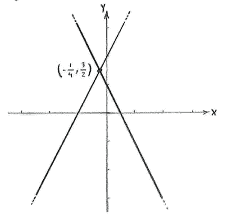Lösung 2.2:6e
Aus Online Mathematik Brückenkurs 1
The lines have a point of intersection at that point which simultaneously satisfies the equations of both lines:
\displaystyle 2x+y-1=0
and
\displaystyle y-2x-2=0.
If we make \displaystyle y the subject of the second equation \displaystyle y-2x-2=0 and substitute it into the first equation, we obtain an equation which only contains \displaystyle x,
\displaystyle 2x+\left( 2x+2 \right)-1=0\ \Leftrightarrow \ 4x+1=0
which gives that
\displaystyle x=-{1}/{4}\;. Then, from the relation
\displaystyle y=2x+2, we obtain
\displaystyle y=2\left( -{1}/{4}\; \right)+2={3}/{2}\;.
The point of intersection is \displaystyle \left( -\frac{1}{4} \right.,\left. \frac{3}{2} \right).
We check for safety's sake that \displaystyle \left( -\frac{1}{4} \right.,\left. \frac{3}{2} \right) really satisfies both equations:
We check for safety's sake that \displaystyle \left( -\frac{1}{4} \right.,\left. \frac{3}{2} \right) really satisfies both equations:
\displaystyle 2x+y-1=0:
LHS =
\displaystyle 2\left( -\frac{1}{4} \right)+\frac{3}{2}-1=-\frac{1}{2}+\frac{3}{2}-\frac{2}{2}=0 =RHS
\displaystyle y-2x-2=0: LHS = \displaystyle \frac{3}{2}-2\left( -\frac{1}{4} \right)-2=\frac{3}{2}+\frac{1}{2}-\frac{4}{2}=0 =RHS

